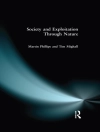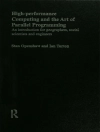‘This timely volume comprehensuvely summerises the various approaches to research that have come to constitute contemporary economic geography. Expert assessments provide a lively sense of the research frontier making this essential reading for all who seek to understand and appreciate the field.’
– Eric Sheppard, University of Minnesota
‘One of the best economic georgraphy texts in recent years, covering both the history of the discipline and outlining areas for future research… The quality of the chapters remains high throughout and many can and should remain as future reference for research and/or teaching.’
– Pedro Marques, Journal of Economic Geography
What difference does it make to think about the economy in geographical terms?
The SAGE Handbook of Economic Geography illustrates the significance of thinking the ′economy′ and the ′economic′ geographically. It identifies significant stages in the discipline′s development, and focuses on the key themes and ideas that inform present thinking.
Organised in sections with multiple chapters, The SAGE Handbook of Economic Geography is a complete overview of the discipline that critically assesses:
- Location, the quantitative revolution and the ′new economic geography′
- Geographies of globalization and capitalism
- Geographies of scale/place and the local/global
- Geographies of nature, agriculture, sustainable development and the political ecology
- Geographies of uneven development, economic decline, and money and finance
- Geographies of consumption and services
- Geographies of regulation and governance, neo-liberalism and welfare.
Placing the discipline in vivid historical and contemporary context, The SAGE Handbook of Economic Geography is a timely, essential work for postgraduates, researchers and academics in economic geography.
Daftar Isi
Introduction – Andrew Leyshon et al
PART ONE: LOCATION MODELS AND QUANTITATIVE ECONOMIC GEOGRAPHY
Locating Location Models – J rgen Essletzbichler
The Quantitative Revolution and Economic Geography – Trevor Barnes
The ′New Economic Geography′: Credible Models of the Economic Landscape? – Ron Martin
PART TWO: POLITICAL ECONOMIES OF SPACE I
Making Sense of Globalization Hegemonic and Counter-Hegemonic Geographies – Richard Peet, Ipsita Chatterjee and Elaine Hartwick
Unpacking Globalization: Changing Geographies of the Global Economy – Neil M. Coe
The Consequences of Economic Globalization – Peter Sunley
PART THREE: POLITICAL ECONOMIES OF SPACE II
The Local in the Global – Martin Jones
Critical Sociospatial Theory and the Geographies of Uneven Spatial Development – Neil Brenner
Space, Place and Labour – Philip Kelly
PART FOUR: POLITICAL ECONOMIES OF SPACE III
The Geographies of Capitalism – Susan Christopherson
Capitalism and Social Justice – Paul Routledge
Globalisation and the City – Jonathan V. Beaverstock, James R. Faulconbridge and Michael Hoyler
Towards a Critical Economic Geography of Workfare – Michael Samers
PART FIVE: POLITICAL ECONOMIES OF NATURE
The Economy of Nature: From Political Ecology to the Social Construction of Nature – Gavin Bridge
The Antonymies of Sustainable Development: Sustaining What, How, and for Whom – David Demeritt
Towards Visceral Entanglements: Knowing and Growing the Economic Geographies of Food – Michael K. Goodman
PART SIX: UNEVEN DEVELOPMENT: GEOGRAPHIES OF ECONOMIC GROWTH AND DECLINE
Geographies of Economic Decline – Ray Hudson
Geographies of Economic Growth I: Industrial and Technology Regions – Nick Henry and Stuart Dawley
Geographies of Economic Growth II: Money and Finance – Michael Pryke
PART SEVEN: GEOGRAPHIES OF CONSUMPTION AND ECONOMIC SPECTACLE
Geographies of Retailing and Consumption: The Shopping List Compendium – Louise Crewe
An Economic Geography of the Cultural Industries – Andy C Pratt
Doing Gender, Performing Work – Linda Mcdowell
PART EIGHT: RETHINKING THE ECONOMIC
Feminist Economic Geographies – Louise Johnson
Ordinary Economic Geographies: Can Economic Geographies Be Non-Economic? – Roger Lee
Towards a Non-Economic, Economic Geography? From Black Boxes to the Cultural Circuit of Capital in Economic Geographies of Firms and Managers – Andrew Leyshon
Tentang Penulis
Professor Peter Sunley is Professor of Economic Geography within Geography and Environment at the University of Southampton.












